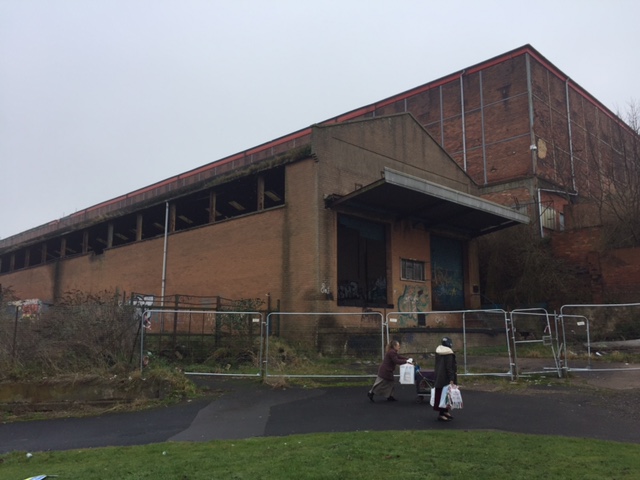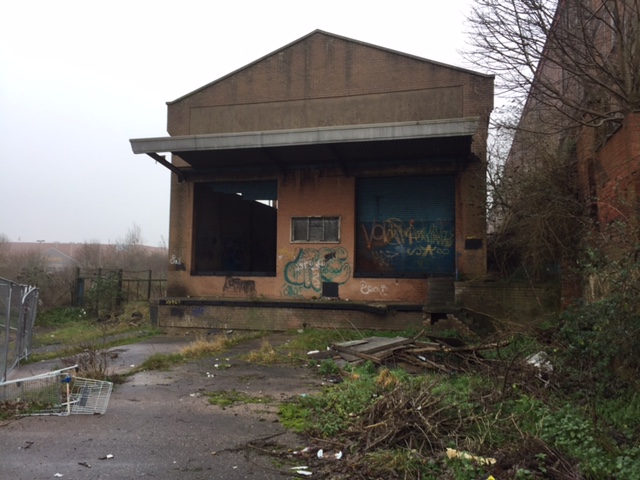Lead image: EDL supporters protesting against a new mosque in Dudley in 2015. Photo by Chris Bethell.
A decaying, rat-infested factory, visited mostly by homeless people and drug users. This is what remains of the site in the small English town of Dudley that, for over a decade, was set to house the town’s new mosque and community centre. It’s a wasteland now, but it could have been so much more.
Videos by VICE
The Dudley Muslim Association (DMA) announced plans to build a new mosque in 2003. In order to meet the needs of the town’s growing Muslim population, it hoped to deliver a space for 750 to 800 worshippers, as well as providing training enterprises, a car park and sports and leisure facilities for the whole community to enjoy.
But what began as a project to regenerate an impoverished area of the town turned into a 15-year battle fought against a backdrop of violence and intimidation, led by the EDL and supported by other far-right groups. In February, the factory will be demolished and the land will be put back on the market. Plans to build a mosque on the site have been abandoned.
This part of the country has long been of powder keg of racial tension – Enoch Powell was Tory MP just down the road in Wolverhampton South West when he made his “Rivers of Blood” speech – and far-right groups have resurfaced there in recent years. In 2015, VICE was in Dudley to witness 700 EDL members descend on the town, chanting, “If you all hate Pakis clap your hands,” and the early-2000s classic “No surrender to the Taliban”.
“I remember the chaos when the EDL first came to our town in 2010: local people were attacked, property was damaged and the mosque, as well as the Hindu and Sikh temples, were targeted,” says MP for Dudley North, Ian Austin.
Instead of moving into a new mosque, the town’s Muslim community will remain tethered to its current site – a former school whose real purpose is only given away by the incongruous white domes on its roof. One look at Dudley Central Mosque will tell you that the building is literally as well as metaphorically ill-fitting; the Muslim community outgrew it years ago.

The site originally marked for the new Dudley mosque. Photo by the author
According to the 2011 census Dudley has a population of 312,925 people, and of those 4.1 percent describe themselves as Muslim. Over the years new mosques have been built for the community, and Dudley’s Muslims have spilled into other buildings, which have become makeshift mosques. For instance, Queens Cross Mosque and Community Centre – which caters for followers of Wahhabism and is not affiliated with Dudley mosque – also sits in Dudley, but this is essentially just a semi-detached house that’s been given the title of a mosque. Dudley is also home to Netherton Islamic Trust, which deserves to be called a mosque and has space for 200 worshippers, as well as a burgeoning education programme, but anyone viewing this location from the street would see it has more in common with a garage than a place of worship.
The lack of space at Dudley Central Mosque means that on Eid two separate services have to be run so there’s enough room for worshippers. But the mosque isn’t just cramped; after years of use it’s also in bad condition. “The current mosque is dilapidated, and it does need urgent repair,” says Naqeeb Ahmed, a member of the board of trustees at Netherton Islamic Trust, and a worshipper at Dudley Central Mosque. “If ever you ever go on a Friday or on an Eid, in terms of space it is at its maximum, so there is definitely a need for a mosque.”
“Dudley mosque on Eid: rammed,” explains local law student and worshipper at Dudley Central Mosque and Netherton Islamic Trust, Khuram Shahzad. “You’ll find people praying outside because it’s too busy.”
What Dudley had when the DMA began its campaign to build a new mosque, and still has today, is a community that needs more space and a site in desperate need of regeneration, but to this date the town hasn’t been able to marry these seemingly shared desires. Surely someone is to blame?
WATCH: Leaders of vandalised mosques respond to Trump’s win.
The EDL is happy to take credit. “We do think the EDL’s public opposition to the mosque played a significant part in the council’s decision,” says a spokesperson for the EDL. “While individuals may not acknowledge – or be prepared to acknowledge – the EDL as a major influence, from our discussions and from reports from our members in the Black Country, we are confident that our analysis is justified.”
The DMA was originally leased the land on the condition that it should be transferred back to the council if the mosque was not developed by the 31st of August, 2008. The DMA says the reason it missed that deadline was because of a long, drawn-out planning process between itself and Dudley Council. However, this claim was not accepted by the Court of Appeal, which ultimately ruled that the land should be transferred back to the Council in November of 2015.
But to many of the town’s Muslims, it looks as though far-right groups have been able to influence decision making. “It will be read like that within Muslim communities,” says Fiyaz Mughal OBE, founder and director of Tell MAMA – an independent organisation that works on tackling anti-Muslim sentiment. “It has been read like that and that’s the long-term damage.”

Photo by the author
Ahmed explains how the Muslim community feel like far-right groups stirred up negative public opinion and “made the whole issue into something that was beyond the local community”. Faced with these inflamed emotions, Ahmed believes Dudley Council did what it could to keep everyone happy. “The likes of the EDL appropriated the issue and galvanised the local public and turned [the issue] into an us and them scenario, where a mosque represents Islam, it represents taking over Dudley and the Christian identity of Dudley. So it made it difficult for everyone.”
Dudley Council disputes that it was influenced in any way by racist sentiment. “The issues around land ownership were determined through the courts based on evidence alone. The High Court and the Court of Appeal examined in detail the history and length of the planning application, and there was no criticism from the Court of the manner in which the council had dealt with the application,” says Councillor Pete Lowe, Labour leader of Dudley
Following the Court of Appeal’s decision, Councillor Lowe says Dudley Council has set up a task group that will work with the DMA to look at alternative sites. However, a spokesperson for the council has since told VICE that there is currently no update on when and if an alternative site will be found. It confirms what the DMA said to the local Express and Star newspaper: that the slow progress is a “frustration and a big disappointment”.
That sense of frustration has permeated through the Muslim community. “The council mentioned that there are other sites where they can extend to, but you don’t hear anything about that any more,” says Shahzad. “Now you’re looking back at it and thinking to yourself: ‘So nothing’s happening with the new site. What happened to other sites being they offered?’ Nothing.”
“We’ve lived here most of our lives. We’re part of the community,” adds Shahzad. “We had the votes, we had enough money, we had the planning permission and it was all set. Look at it now; it’s a couple of years on and it’s still desolate. No one even gives a crap about it.”
As the demolition balls roll in, we’re really no closer to knowing if and when a new mosque will be built in Dudley. But beyond the site, the damage done to the Muslim community and race relations in the town will be hard to rectify.
As Mughal says: “This is years of work ahead to try to reconcile. There’s real damage here, and I think the option for more extreme groups to keep playing in that area is going to carry on for the next few years because of this decision.”
The DMA could not be reached for comment.
Update: This article was amended on 13th February to make it clear that the Queens Cross Mosque and Community Centre caters for followers of Wahhabism and is not affiliated with Dudley mosque, which is orthodox Sunni.
More on VICE:
We Visited One of Britain’s Most Muslim Areas to See If It’s Really an Islamist Ghetto
British Muslim Women Talk About How It Feels to Be Constantly Spoken For




